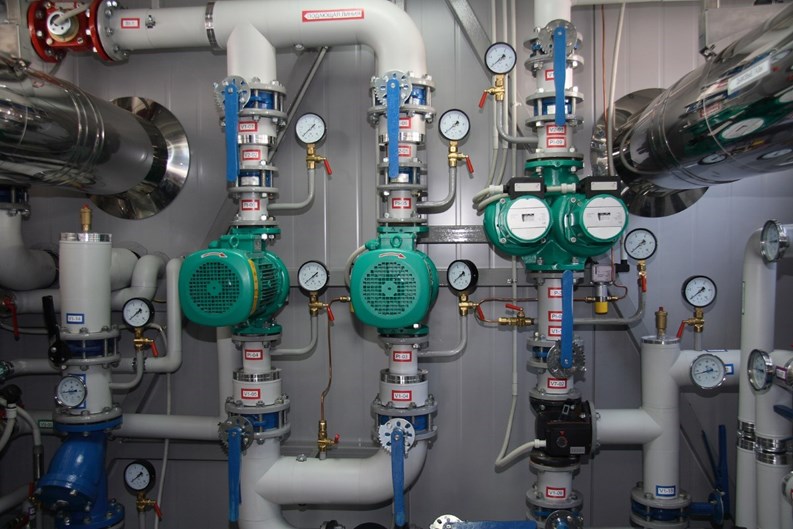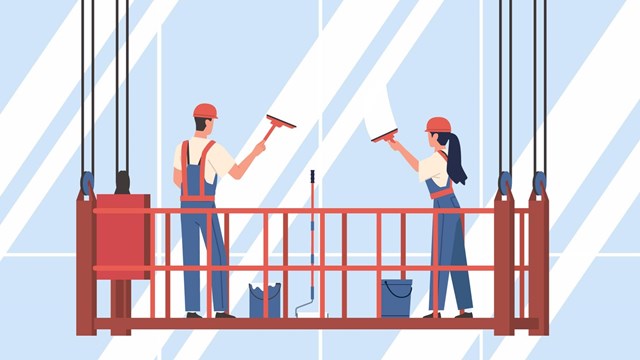Modern cities are amazing creations, pulsing with life 24 hours a day, and built to cater to every need of residents. Take away just one of any city dweller’s basic necessities like plumbing, electricity or heating/air conditioning, though, and the big city quickly becomes a nearly unlivable concrete jungle. Without our modern conveniences, in no time the Windy City is a snowy desert.
The discomfort and inconvenience of being stuck without plumbing or heat for just a few days can seem unbearable to many people. Sometimes these inconveniences are just part and parcel of life in the Midwest—such as during a heavy storm, for example—but often, energy stoppages can be avoided. Murphy's Law might suggest that a co-op or condo building’s boiler will inevitably break down on the coldest, snowiest day of the year and leave all of the residents freezing, but even Murphy can be foiled if you understand the workings of your building’s boiler and its maintenance needs. Knowing those basics will help ensure that you’ll never need to use the electric space heater stashed in back of your closet.
Revving Performance
Keeping a boiler humming requires off-season maintenance and regular checkups. Boilers are machinery that are in near-constant use when they are needed most and like any equipment, sometimes they have problems. But regular maintenance can prevent many of those problems, such as when a boiler is not cleaned properly or regularly and residue builds up in the equipment. To prevent excessive residue accumulation, a building’s superintendent or chief engineer can open the boiler’s blow-down valve for a few seconds each day, which cleans out the residue. A boiler’s motors should also be cleaned and lubricated monthly.
A building’s chief engineer or superintendent also should clean an oil-burning system’s oil strainer once a week. If this task is not done, dirt will clog the strainer and shut down the system. A building engineer/super should visually inspect the boiler at least weekly, though some pros suggest checking it daily. When checking the boiler, remember to also inspect the bolts on the pump, check the water level and always check for oil leaks or water leaks.
Lack of maintenance could be the most common way boilers deteriorate prematurely. Surprisingly, many owners neglect this crucial piece of equipment.
“Once they replace the boiler, people take it for granted,” says Don Placko, a manager for Hayes Mechanical in Chicago. “But with proper maintenance and water treatment, a boiler should last at least 15 years. We work on boilers that are 50, 75—even 100 years old.”
Water circulation issues and sediment buildup and leaks are the two main factors leading to boiler problems, says Lisa DeMaso, manager of strategic partnership for Four Seasons Heating, Air Conditioning & Plumbing in Bedford Park.
Many water treatment companies offer services of regulating and maintaining the water in the system, and achieving its optimum chemistry, Placko says. Symptoms of problems with a boiler could be excessive sediment in the boiler and lack of heat transfer. 'Scale' or sediment buildup on the boiler tubes or the burner will make the equipment work improperly and can cause soot accumulation, which lowers efficiency and can become a fire hazard.
With proper maintenance, a boiler can last for decades. But because the machinery uses water, which is corrosive, boilers must be regularly checked for leaks or malfunctions. Ideally, the building engineer or the superintendent and the boiler servicing company should work together to keep an eye on all of the boiler system’s parts, including the radiators in the apartments. Boiler servicing companies can teach the building’s engineer or any other employees who oversee the boiler’s operation how to troubleshoot the system. Some service companies will provide this training when they install a new boiler, or when a new building engineer or super is hired for the building.
Boiler systems need a watchful eye because even a few pinhole leaks in could escalate into twenty tiny leaks, eventually draining away a building’s reserve funding.
Boilers should be regularly treated chemically, to neutralize any corrosive agents that are coming into the system from the water. The boiler’s water should be tested and chemically treated at least six times per year, depending upon the type of boiler. Chemical treatments are essential because they neutralize the oxygen content in the system, which is important because oxygen also is a corrosive agent. Excess oxygen in the system means faster corrosion of the equipment.
While the frequency of these treatments depends on the boiler type, the need for the treatments depends also upon how heavily the boiler is used. The more frequently a boiler is operated, the more chemical treatments it will need. Major fixes on a boiler should always be left to boiler servicing companies.
Steam-Powered Boilers
Unlike many major American cities, Chicago has a high percentage of steam boiler systems. Steam systems are a thing of the past elsewhere in the country, but here they never left and are in a resurgence. Likely due to the vast amount of industrialization of the region a century ago, in Chicago, steam systems in residential buildings are among the oldest, greenest energy systems here. They are once again being recognized for their economy, efficiency and durability.
That’s a good thing for Dave Bunnell, owner of The Steam Whisperer, based in Evergreen Park. The company services boilers in the metro Chicago area, specializing in steam systems. “Steam heating appears to be making a comeback,” he says.
Unfortunately, many boiler service companies are not well-versed in the nuances of steam heating systems and so mistakes can be made in their repair, Bunnell says. Residents might even hear if some of these errors were made.
For example, sometimes a newer boiler is installed to replace an antiquated steam system but the boiler is the wrong size for the system. That will result in higher fuel bills, banging noises (also called “water hammer”) coming from the pipes and or radiator, and an overall shorter boiler life. Secondly, sometimes boilers in steam systems aren’t retrofitted with pipes correctly, because the pipes don’t meet the industry or manufacturer’s standards or specifications.
Thirdly, inadequate air vents in the system can cause problems, since antiquated systems need to be updated for a modern boiler system and sometimes those vents are overlooked when the system is updated. Finally, a lack of regular maintenance of a boiler system also can make it deteriorate faster than a normal 15- to 20-year life span. That means at least a yearly checkup that includes a list of items to be addressed. For a 2 million BTU system, this checkup might take a day’s work by a boiler maintenance pro.
Winter Preparations
At least once a year, a building’s boiler and heating system should be checked on, experts say. And at least annually, a boiler should be cleaned by a professional, including vacuuming the fireside of the boiler to remove soot and ensure the machinery will run efficiently.
During the annual servicing, a boiler’s oil burner should be overhauled. This involves breaking down the oil burner and checking all of its operating parts and replacing worn parts that are likely to fail, before they become a problem. A boiler’s efficiency should be tested as well at that time.
In addition to checking the boiler’s water level, a technician should skim the boiler if needed. “Skimming” is the practice of overfilling the boiler, boiling the water and then opening the boiler. If any oil or sediment is in the boiler, it rises to the top and is pushed out, says Dan Reynolds, the service manager for Chicago-based Four Seasons Heating, Air Conditioning & Plumbing.
Annual servicing of a boiler should be done before the cold weather season begins. The average annual maintenance call to service a boiler takes about six hours and should be done by a service company, not by the building’s engineer or the superintendent. The engineer or the super can monitor the boiler, keeping an eye out for motor or oil leaks, or any gas odor that might indicate a leak. The boiler room should be visited daily during the winter months so that building staff can assure that the machinery sounds okay and is working properly.
With steam systems, a variety of steps are performed during annual inspections, including ensuring that the low water safety cutoffs work, and dismantling and cleaning the associated pipes. The pressure release valve should be checked to make sure it’s clear and it should be manually opened to ensure it’s functioning. A technician should also check to see that the gauge glass is functioning, and should clean and flush the bottom of the boiler including the water return lines.
Take Your Pressure
Pressure controls should also be checked to see that they are working, and the pilot light and all flame controls should be checked to see that they are operating. A combustion test also should be done yearly on the boiler, and the draft in the chimneys should be checked after the boiler is fired up, to ensure the chimneys are drawing properly.
“It’s like taking a boiler’s blood pressure. It’ll show you if the flame’s burning properly,” says Bunnell of the combustion test.
If the flame isn’t burning properly or the chimneys aren’t drawing properly, it could produce a dangerous amount of carbon dioxide.
With winters as nasty as they’ve been recently, having the boiler working efficiently is essential. No one wants to wake up to a cold apartment and feel stuck there with the heater broken down. A thorough pre-winter maintenance visit by a professional will ensure that this won’t happen.
Pre-winter maintenance should start with a thorough brushing out, vacuuming and cleaning of the boiler. The smoke pipe and chimney should be cleaned at the time and the boiler should be inspected for any signs of leaks. Leaks should be repaired and worn parts replaced during an overhaul of the burner. Finally, the burner should be fired off and tested to verify that it is working properly.
Annual servicing should be done before the cold weather comes, sometime from January 1 to early October at the latest. This tune-up should be done by a licensed boiler installer. Most building engineers or supers are not qualified to do this work, nor are they qualified to do yearly boiler inspections.
While there is no required certification for working on boilers in the state of Illinois, some specific commercial applications require that engineers be on-site to operate some boilers. The International Union of Operating Engineers, Local 399 in Chicago, offers a variety of training courses and seminars to educate and train members to meet industry demand. Classes include topics such as boiler operations, indoor air quality, electricity, energy conservation, basic HVAC controls, indoor air quality, facilities sustainability, boiler license prep, engineering and locksmith training. Special training for chief engineers is also provided. Classes are held at a new, state-of-the-art training center in Chicago and several classes are also available online, providing flexibility for busy members. SEIU Local 1 also conducts boiler training for chief engineers and supers at its West Loop training center. Chief engineers need 6 hours of continuing education training annually; assistant engineers, 8 hours. Reynolds says, if you are not sure if your building staff is qualified, call a company that employs experienced boiler technicians.
Jonathan Barnes is a freelance writer and frequent contributor to The Chicagoland Cooperator.







Leave a Comment